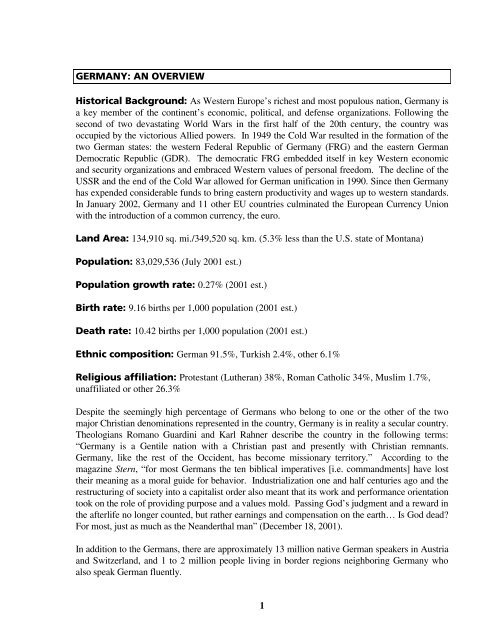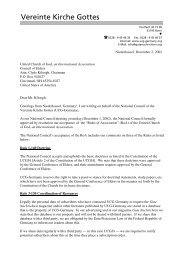Download PDF file - Vereinte Kirche Gottes
Download PDF file - Vereinte Kirche Gottes
Download PDF file - Vereinte Kirche Gottes
You also want an ePaper? Increase the reach of your titles
YUMPU automatically turns print PDFs into web optimized ePapers that Google loves.
GERMANY: AN OVERVIEW<br />
Historical Background: As Western Europe’s richest and most populous nation, Germany is<br />
a key member of the continent’s economic, political, and defense organizations. Following the<br />
second of two devastating World Wars in the first half of the 20th century, the country was<br />
occupied by the victorious Allied powers. In 1949 the Cold War resulted in the formation of the<br />
two German states: the western Federal Republic of Germany (FRG) and the eastern German<br />
Democratic Republic (GDR). The democratic FRG embedded itself in key Western economic<br />
and security organizations and embraced Western values of personal freedom. The decline of the<br />
USSR and the end of the Cold War allowed for German unification in 1990. Since then Germany<br />
has expended considerable funds to bring eastern productivity and wages up to western standards.<br />
In January 2002, Germany and 11 other EU countries culminated the European Currency Union<br />
with the introduction of a common currency, the euro.<br />
Land Area: 134,910 sq. mi./349,520 sq. km. (5.3% less than the U.S. state of Montana)<br />
Population: 83,029,536 (July 2001 est.)<br />
Population growth rate: 0.27% (2001 est.)<br />
Birth rate: 9.16 births per 1,000 population (2001 est.)<br />
Death rate: 10.42 births per 1,000 population (2001 est.)<br />
Ethnic composition: German 91.5%, Turkish 2.4%, other 6.1%<br />
Religious affiliation: Protestant (Lutheran) 38%, Roman Catholic 34%, Muslim 1.7%,<br />
unaffiliated or other 26.3%<br />
Despite the seemingly high percentage of Germans who belong to one or the other of the two<br />
major Christian denominations represented in the country, Germany is in reality a secular country.<br />
Theologians Romano Guardini and Karl Rahner describe the country in the following terms:<br />
“Germany is a Gentile nation with a Christian past and presently with Christian remnants.<br />
Germany, like the rest of the Occident, has become missionary territory.” According to the<br />
magazine Stern, “for most Germans the ten biblical imperatives [i.e. commandments] have lost<br />
their meaning as a moral guide for behavior. Industrialization one and half centuries ago and the<br />
restructuring of society into a capitalist order also meant that its work and performance orientation<br />
took on the role of providing purpose and a values mold. Passing God’s judgment and a reward in<br />
the afterlife no longer counted, but rather earnings and compensation on the earth… Is God dead?<br />
For most, just as much as the Neanderthal man” (December 18, 2001).<br />
In addition to the Germans, there are approximately 13 million native German speakers in Austria<br />
and Switzerland, and 1 to 2 million people living in border regions neighboring Germany who<br />
also speak German fluently.<br />
1



